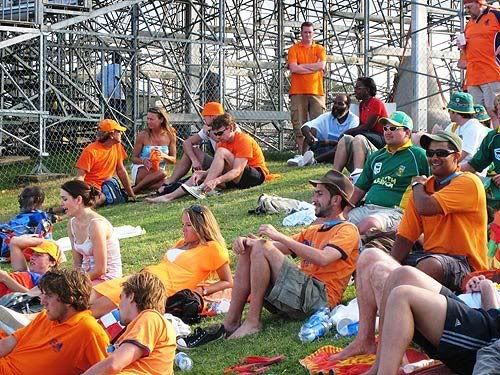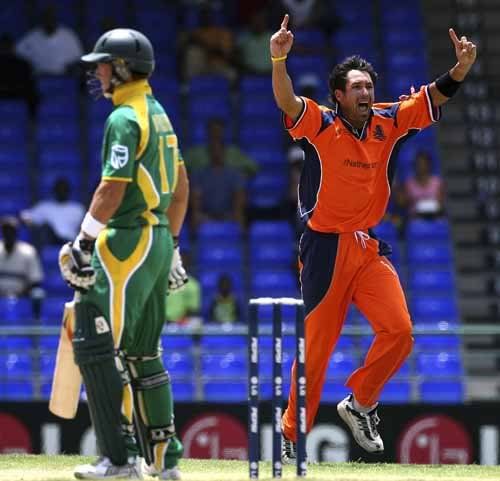

The Dutch cricket team is a national cricket team representing the Netherlands. It is administered by the Koninklijke Nederlandse Cricket Bond (Royal Dutch Cricket Association) which is based in Nieuwegein in the centre of the country and is older than many renowned cricket clubs in the West Indies, Australia, and New Zealand.
Cricket has been played in the Netherlands since at least the 19th century, and in the 1860s was considered a major sport in the country. Many other sports (notably football) have long since surpassed cricket in popularity amongst the Dutch, and today there are around 6,000 cricketers in the Netherlands, making it the 25th most popular sport. The first national association, the forerunner of today's Royal Dutch Cricket Association, was formed in 1883 and the Netherlands achieved Associate Membership of the ICC in 1966.
The Dutch team has taken part in all eight ICC Trophy tournaments, winning the competition in Canada in 2001 and finishing as runners-up twice (in 1986 and 1990). The Netherlands have also participated in the 1996, 2003 and 2007 Cricket World Cups, and from 1996 onwards entered the English domestic NatWest Trophy competition (and its successor, the C&G Trophy). In 2004 they played first-class cricket as part of the ICC Intercontinental Cup, drawing with Scotland in Aberdeen and then going down to an innings defeat against Ireland in Deventer.
In 2005 the Dutch team beat the UAE to finish fifth in the ICC Trophy, a slightly disappointing result but one which meant that they qualified for the 2007 World Cup and would gain full One Day International status from 1 January 2006 until the 2009 ICC Trophy.
HISTORY:
19th century-
Cricket was introduced to the Netherlands by British soldiers during the Napoleonic Wars in the 19th Century and the Cape Colony in 1856. Further clubs came into existence in the 1870s. The Netherlands national team played their first game in 1881. They fielded 22 players against an Uxbridge Cricket Club XI, but still lost by an innings. The Dutch Cricket Union was formed in 1883, with 18 member clubs, four of which are still in existence today.
The first national tournament was held the following year, and was won by Haagsche CC. English touring teams then began visiting in 1886 including one in 1891 that featured Sherlock Holmes author, Sir Arthur Conan Doyle.
In 1894, the Gentlemen of Holland became the first Dutch team to visit England. The tour included a game against the MCC at Lord's, which the MCC won by an innings and 169 runs. Tours by English sides continued for the rest of the 1890s, which also saw the emergence of Carst Posthuma, who was to become the first Dutch player to play first class cricket. He was eventually to take 2339 wickets at an average of 8.66 in his career in the Netherlands.
1900s to 1910s-
1901 saw another visit to England by the Gentlemen of Holland. They played five games on the tour, drawing two and the losing the remainder. 1905 saw the first international game against Belgium, which finished in a draw.
In 1910, the Dutch team visited Belgium to take part in an exhibition tournament, which also featured the MCC, Belgium and France. They lost to the MCC by 2 wickets, and to France by 63 runs, but beat Belgium by 116 runs.
During World War I, in which the Netherlands remained neutral, large numbers of British officers were interned in the country, and many of these joined local cricket clubs. A team made up of these players even won the Dutch championship in 1918.
1920s to 1940s-
The Flamingo's, a Dutch touring side, was formed in 1921, they would go on to make several tours of England. Tours by English teams would continue in this period also. The 1930s are said to be the decade in which Dutch cricket thrived the most, with cricket curtailed somewhat after the German invasion in 1940, due to its association with the British military. In 1934, the first Dutch women's league was formed, and the women's national team played two games against Australia in 1937, losing heavily in both. Cricket was curtailed somewhat after the German invasion in 1940.
1950s to 1980s-
The 1950s saw visits to the Netherlands by Australia and the West Indies, in addition to the first match against Denmark. In 1958, the Cricket Board received a Royal charter, and became the "Koninklijke Nederlandse Cricket Bond", a name which it retains to this day.
1964 brought the Netherlands first victory against a Test-playing nation, with a 3 wicket win over the Australian team. They were rewarded with associate membership of the ICC two years later.
The first two ICC Trophy tournaments, in 1979 and 1982 brought little success to the Dutch, not progressing beyond the first round in both tournaments. But in the 1986 tournament, they finished as runners up to Zimbabwe. The same year, Paul-Jan Bakker became the first Dutch player to play county cricket. In 1989, the Dutch beat a strong England XI that featured two future England captains in Alec Stewart and Nasser Hussain by 3 runs.
1990s-
1990 would once again see the Dutch finish runners up to Zimbabwe in the ICC Trophy, a tournament they hosted. (The first outside England) Test nations would be beaten again in 1991, which saw a 5 wicket win over the West Indies, in 1993, which saw a 7 wicket win over England, and in 1994, which saw a 9 wicket win over South Africa. 1994 would also finally see the Dutch qualify for the World Cup, after finishing third in that year's ICC Trophy. In the World Cup itself in 1996, they didn't progress past the first round, but performed with some credit in their game against England.
1995 saw the Dutch enter the NatWest Trophy for the first time, and they would spend 10 years in the tournament, their best performance coming in 1999, when they progressed to the 4th round, beating Durham along the way. 1999 also saw a World Cup game come to the Netherlands, but sadly for them the Dutch were not involved, after a 6th place finish in the 1997 ICC Trophy.
The Netherlands competed in the first European Championship in 1996, coming second. They have competed in every tournament since, winning in 1998 and 2000.
2000s-
2001 finally saw the Netherlands win the ICC Trophy, beating Namibia in the final in Toronto. They thus qualified for the 2003 World Cup. They again failed to progress beyond the first round in the tournament, but recorded their first ODI win over Namibia during the tournament.
In the 2005 ICC Trophy, the Netherlands finished 5th, qualifying for the 2007 Cricket World Cup, and gaining one-day International status until the 2009 ICC World Cup Qualifier. Their first ODI with this new status was intended to be against Kenya in March 2006, however this match was cancelled due to a Kenyan tour of Bangladesh. Instead their first ODI with this status (and their twelfth overall) came against Sri Lanka in what was their first ODI at home. This ended in disappointment though as the Dutch conceded a record ODI score of 443/9. They lost the two match series 2-0.
The Dutch played their first Intercontinental cup game of 2006 against Kenya in Nairobi in March. The game finished in a draw, with the Netherlands gaining six points for having a first innings lead. In August, the Netherlands competed in Division One of the European Championship. They beat Denmark and Italy, but lost to Scotland and their game against Ireland was rained off. They finished third in the tournament.
In November, the Dutch travelled to South Africa. They first played an Intercontinental Cup match against Bermuda, with David Hemp scoring a then competition record of 247 not out in the drawn match. This was followed by a triangular series against Bermuda and Canada, which they won. Their final game of 2006, also in South Africa, was an Intercontinental Cup game against Canada. They won the match by 7 wickets, with Ryan ten Doeschate setting a new competition record individual score of 259 not out.
In early 2007, they travelled to Nairobi, Kenya to take part in Division one of the World Cricket League, finishing third in the six team total. This was followed by the 2007 World Cup in the West Indies, where they did not progress beyond the first round, though they did beat Scotland along the way.
Following the World Cup, they underwent a period of transformation. Captain Luuk van Troost retired, as did Tim de Leede and their coach Peter Cantrell. Daan van Bunge also opted to take a break from international cricket, and the new coach opted not to retain the services of bowling coach Ian Pont.
In June 2007, they visited Canada, first winning an Intercontinental Cup match against Canada in King City, Ontario. They then won the first ODI by 117 runs, with the second one being abandoned. They then played a quadrangular series in Ireland, losing by ten wickets to the West Indies, and by one run to Ireland, with the game against Scotland being abandoned due to rain.
FAMOUS PLAYERS:
Several Dutch cricketers have also played at first-class level elsewhere, the most successful of these probably being Roland Lefebvre who played for Somerset and Glamorgan in English county cricket as well as for Canterbury in New Zealand. The Essex all-rounder Ryan ten Doeschate and Worcestershire batsman Alexei Kervezee are the only current members of the Dutch team to be playing county cricket.
Other Dutch players to have played first class cricket outside of the Intercontinental Cup are:
A portal to Cricket in the Netherlands can be viewed by right clicking HERE
















No comments:
Post a Comment